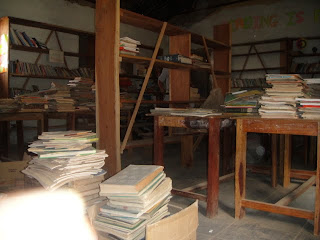So I’m sitting in our wee living room in front of the fan, which is whizzing like Billy Ho, however he may whizz, reviewing the Easter weekend. We’ve had friends to stay, Kate and Lucy. Phil lives nearby on the island and he’s been here too. It’s been great being able to talk freely, without worrying about greetings, language or political correctness. We’ve laughed a lot. They are part of our little Gambian family. It’s strange to think that we are so close, whereas, in Britain, we probably wouldn’t have spoken a word to each other. Common experiences eh!
Work is very slow for a variety of reasons and, not being the most patient of people, we want to get on with it. Easter holidays now so schools are closed and the main people are out of the office for the week too. We’re hoping that on their return we can have a review and really get things sorted – after all we’ve been here two months already, a sixth of our stay.
Mulai our muscle packed, skinny landlord is brilliant. He allows us to let off steam and then smiles sagely and says, “This is The Gambia” and then bustles around to introduce us to the right people and gets things going in whatever way he can. He’s embarrassed to be male for he reckons that it’s the women who do all the work while the men sit under the trees drinking attaya. Apparently women account for 70 per cent of the economy on the island.
He called for us the other evening. Leading us out of our compound*, alongside our little house, across the gritty ground with goats rummaging amid rubbish and debris we came to a whole new area of African bush. Beautiful long tailed metallic blue birds flittered here and there as dragonflies darted back and for. Yellow headed, purple bodied, lizards scuttled through the dried grasses and over rocks. We followed narrow twists and turns through limbs and fingers of wood, scratching legs and flip flop adorned feet, chatting amiably about work frustrations and lack of output.
At six the temperature drops a tad but ambling is still best. Half an hour later we spotted an oasis of green in the otherwise ochre landscape. An elderly woman with spindle legs and cataract eyes stood by the gaping hole of the concrete well, hauling up water with a makeshift bucket and lengths of knotted fabric reminiscent on the great escape. Animated in her one toothed speech she explained that the badly built well was not deep enough to maintain a water flow hence the muddy sludge fifty foot down. She and the other women need water to irrigate their onions, okra, sorrel and aubergines at least twice a day in this heat. Their produce feed their compounds and any surplice sold in the market buys the rice. Surrounded by termite-infested sticks, interwoven with others, the allotments are thriving by determination and hard hard work.
As VSO’s we have access to funding from the British High Commission to support small community projects. Our predecessor used hers to build a bridge, allowing the women to cross to the rice fields in the rainy season, rather than swim or take a mile detour. Mulai and the women’s co-operative are hoping for support to re-bore the well and build animal proof, permanent fencing.
We continued on our way to visit the funded gardens a mile away. It was abuzz with activity and crops. Bare breasted, muddy women and female children, babies tied to backs, drawing water to quench the parched land and crops, surrounded metal fencing and plentiful wells. Chatter and smiles. Plants flourishing with twice daily care and attention, misshapen tools from the middle ages and machetes used with lethal accuracy. We watched, uplifted and yet exhausted, with incredulity, the energy and physical strength as containers of water were lifted onto heads over and over again. The heat still radiated from the land as the sun faded in the sky as we wandered like gaggles of geese, back to town, laughing and joking. Women in this part of the world do not have it easy.
*Everything is so different here. A compound is a where a mini community live. It may, unusually like ours, consist of one family but more likely, will comprise of the extended family in an array of accommodation. Often fenced with pieces of corrugated iron nailed haphazardly together, feeding, childcare and general living are a joint responsibility. Polygamy is common and men folk are often away with their other wives and children or elsewhere leaving the women to manage on a day-to-day basis.











